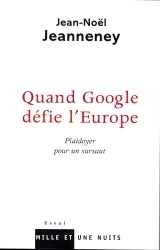 I just came across the pre-pub materials for a book, due out this November from the University of Chicago Press, by Jean-Noël Jeanneney, president of the Bibliothè que Nationale de France and famous critic of the Google Library Project. You’ll remember that within months of Google’s announcement of partnership with a high-powered library quintet (Oxford, Harvard, Michigan, Stanford and the New York Public), Jeanneney issued a battle cry across Europe, warning that Google, far from creating a universal world library, would end up cementing Anglo-American cultural hegemony across the internet, eroding European cultural heritages through the insidious linguistic uniformity of its database. The alarm woke Jacques Chirac, who, in turn, lit a fire under all the nations of the EU, leading them to draw up plans for a European Digital Library. A digitization space race had begun between the private enterprises of the US and the public bureaucracies of Europe.
I just came across the pre-pub materials for a book, due out this November from the University of Chicago Press, by Jean-Noël Jeanneney, president of the Bibliothè que Nationale de France and famous critic of the Google Library Project. You’ll remember that within months of Google’s announcement of partnership with a high-powered library quintet (Oxford, Harvard, Michigan, Stanford and the New York Public), Jeanneney issued a battle cry across Europe, warning that Google, far from creating a universal world library, would end up cementing Anglo-American cultural hegemony across the internet, eroding European cultural heritages through the insidious linguistic uniformity of its database. The alarm woke Jacques Chirac, who, in turn, lit a fire under all the nations of the EU, leading them to draw up plans for a European Digital Library. A digitization space race had begun between the private enterprises of the US and the public bureaucracies of Europe.
Now Jeanneney has funneled his concerns into a 96-page treatise called Google and the Myth of Universal Knowledge: a View from Europe. The original French version is pictured above. From U. Chicago:
Jeanneney argues that Google’s unsystematic digitization of books from a few partner libraries and its reliance on works written mostly in English constitute acts of selection that can only extend the dominance of American culture abroad. This danger is made evident by a Google book search the author discusses here–one run on Hugo, Cervantes, Dante, and Goethe that resulted in just one non-English edition, and a German translation of Hugo at that. An archive that can so easily slight the masters of European literature–and whose development is driven by commercial interests–cannot provide the foundation for a universal library.
Now I’m no big lover of Google, but there are a few problems with this critique, at least as summarized by the publisher. First of all, Google is just barely into its scanning efforts, so naturally, search results will often come up threadbare or poorly proportioned. But there’s more that complicates Jeanneney’s charges of cultural imperialism. Last October, when the copyright debate over Google’s ambitions was heating up, I received an informative comment on one of my posts from a reader at the Online Computer Library Center. They had recently completed a profile of the collections of the five Google partner libraries, and had found, among other things, that just under half of the books that could make their way into Google’s database are in English:
More than 430 languages were identified in the Google 5 combined collection. English-language materials represent slightly less than half of the books in this collection; German-, French-, and Spanish-language materials account for about a quarter of the remaining books, with the rest scattered over a wide variety of languages. At first sight this seems a strange result: the distribution between English and non-English books would be more weighted to the former in any one of the library collections. However, as the collections are brought together there is greater redundancy among the English books.
Still, the “driven by commercial interests” part of Jeanneney’s attack is important and on-target. I worry less about the dominance of any single language (I assume Google wants to get its scanners on all books in all tongues), and more about the distorting power of the market on the rankings and accessibility of future collections, not to mention the effect on the privacy of users, whose search profiles become company assets. France tends much further toward the enlightenment end of the cultural policy scale — witness what they (almost) achieved with their anti-DRM iTunes interoperability legislation. Can you imagine James Billington, of our own Library of Congress, asserting such leadership on the future of digital collections? LOC’s feeble World Digital Library effort is a mere afterthought to what Google and its commercial rivals are doing (they even receive private investment from Google). Most public debate in this country is also of the afterthought variety. The privatization of public knowledge plows ahead, and yet few complain. Good for Jeanneney and the French for piping up.
